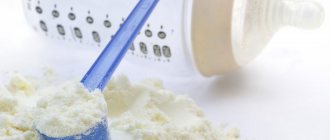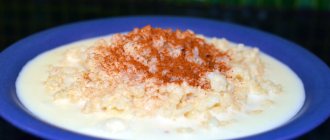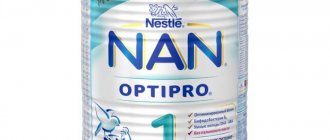Medical nutrition
There are several types of infant formula intended for treatment:
- for nutrition of premature infants, enriched with a complex of vitamins, proteins and proteins with increased calorie content for rapid weight gain;
- for babies with iron deficiency anemia (low hemoglobin);
- lactose-free and soy formulas - suitable for children with intolerance to cow's milk protein;
- antireflux - for babies suffering from regurgitation;
- hypoallergenic, containing hydrolyzed protein;
- fermented milk, which is prescribed to children to solve digestive problems.
Fermented milk infant formula has a probiotic effect and normalizes the digestive process in newborns and infants, due to the content of beneficial substances and microorganisms that have a beneficial effect on the gastrointestinal tract, forming microflora in the intestines and stomach.
The main components of such mixtures are coagulated milk proteins, fermented under the influence of bifidobacteria or lactobacilli, thermophilic streptococcus, etc. In terms of their composition, they are as close as possible to human breast milk and are intended for children from 0 to 1 year. Packages with such mixtures are always marked with the inscription KM (fermented milk).
special instructions
When giving fermented milk mixture to a child, you need to carefully monitor the baby’s condition: whether a rash has appeared on the body, whether there is diarrhea or regurgitation. If the body reacts to the product in such a way, the child should be shown to a pediatrician. Usually, all signs disappear on the second day after switching to a new diet, so the body adapts to new conditions. However, the following signs indicate that the product is not suitable for the baby at all:
- allergic reactions;
- frequent loose stools;
- the baby remains hungry after feeding;
- the child is lethargic and capricious;
- no weight gain;
- disturbance of night sleep.
You can choose a mixture only on the recommendation of a pediatrician, refusing to independently introduce new products. If a fermented milk formula is suitable for your child, you should not give another without special reasons, as the intestinal microflora can be disrupted.

Varieties and composition
Fermented milk mixtures for children are classified according to consistency into:
- dry fermented milk mixtures for baby food (“NAN”, “Nutrilon”, “Malyutka”, etc.);
- liquid (“Agusha”, “Bifilin”).
Classification of mixtures according to the degree of adaptation, i.e. closeness in composition to mother's milk:
- adapted, i.e. as close as possible to breastfeeding - marked “1” and used for children from birth to 6 months, some up to 12 months;
- partially adapted - marked with the number “2”, they are given to children from six months;
- unadapted, which include fermented milk products (sourdough, yogurt, kefir), which can be used for children from 8 months.
The process of preparing the mixture and fermenting milk consists of several stages:
- milk protein is broken down into easily digestible fragments (peptides, peptones, free amino acids), which reduces its ability to cause an allergic reaction;
- milk fat breaks down and free acids accumulate, which can be absorbed with little activity of digestive enzymes;
- Under the influence of microorganisms, milk lactose is converted into lactic acid, forming important biosubstances: bactericidal (nicosin, nisin), vitamins and enzymes.
The composition of the adapted mixtures also includes additional components: vegetable oils, minerals and vitamins, which brings their composition closer to breast milk.

Which companies produce formula for newborns?
Nestle
On sale you can find a large number of different brands of fermented milk mixture from domestic and foreign manufacturers. Nan fermented milk produced by Nestle Switzerland. In the production of this mixture, the Bio-fermentation method is used, as a result of which:
- the degree of protection against gastrointestinal infections increases;
- the digestion process improves;
- The microflora of the stomach is normalized.
The process of biological fermentation occurs with the help of living lactic acid bacteria. The mixture contains an optimized protein complex , which is quickly absorbed, provides the child’s body with protein and is a remedy for constipation.
The mixture contains two probiotics , which are absolutely harmless and are recommended for babies from the first days. Due to the presence of protein in the mixture, it is considered the closest to breast milk.
Follow the instructions strictly; the amount of mixture in the spoon should not be heaped. The proposed proportions can be changed only after consultation with a pediatrician.
The shelf life of the product is 18 months , the production date is indicated on the bottom of the jar. Once opened, the mixture must be used within 3 weeks; it is not recommended to store it in the refrigerator.
Nutrilon
The following fermented milk mixture is produced in Holland by Nutricia. Nutrilon is considered one of the highest quality mixtures and is recommended for babies suffering from constipation and allergies to milk protein. The mixture is produced through the process of fermentation with a starter consisting of lactic and bifidobacteria.
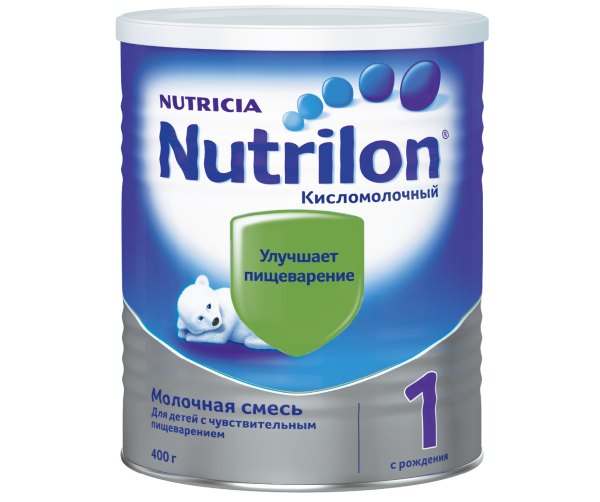
In addition, the mixture contains iodine and iron, which are beneficial for the baby’s body. The mixture contains starch, which normalizes intestinal function. Fermented milk mixture Nutrilon can be used with breast milk . It is necessary to dilute the mixture strictly following the instructions in the instructions.
For constipation, which occurs in newborns, fermented milk mixture is used to eliminate the problem. The choice depends on several reasons, one of which is price. Domestic mixtures are cheaper, and the choice of imported ones is greater, and the latest technologies are used in their production. Therefore, to eliminate constipation, as a medicinal mixture, you need to carefully study the composition, and also listen to the recommendations of your pediatrician.
Nutrilak
The domestic fermented milk mixture Nutrilak is intended for children over one year of age who experience constipation ; it prevents dysbacteriosis and populates the intestines with beneficial microflora. It is obtained as a result of fermentation of milk mixture with bacteria, including thermophilic streptococcus.
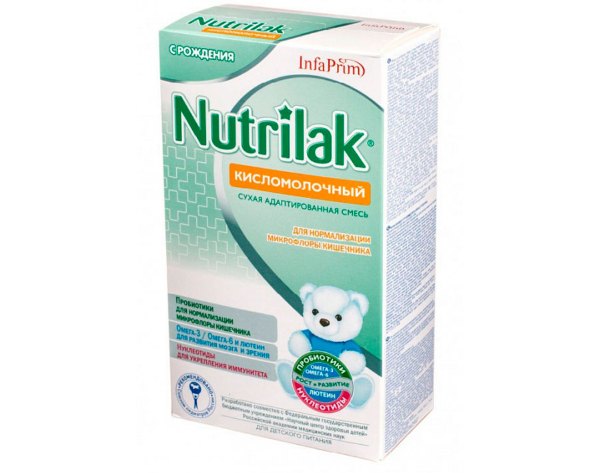
Agusha
Another domestic fermented milk mixture is Agusha (Wimm Bill Dann, Russia). This is a ready-to-use liquid mixture that only needs to be heated. Please note that it contains more protein and sucrose . There are two types of Agusha 1 and 2, the first is intended for up to 6 months of age, the second from six months with the addition of fructose and corn oil.
The advantages of the mixture include its convenient form: it is ready for use , so mistakes are excluded when diluting the dry mixture. Negative aspects include a large number of vegetable oils and food additives, for example, whey protein concentrate, as well as a short shelf life - ten days in the refrigerator .

Adding fermented milk mixture to your usual food should be agreed with your pediatrician
Fermented milk mixture comes to the rescue, the choice of which is varied. For newborns with problems with the gastrointestinal tract, in particular constipation, it is necessary to be very careful when choosing a formula.
It is not recommended to do this on your own; you should definitely consult a pediatrician. Introduce the mixture gradually, observing the child’s condition. The mixture must be prepared before use, do not heat it in a microwave oven , and do not use the remaining mixture for the next dose. Strictly follow the instructions in the instructions that come with the mixture.
In the video you can watch instructions for preparing formula for babies:
Pediatrician's opinion on fermented milk formulas:
https://www.youtube.com/watch?v=kuHKHO7I9gA
Useful information on the care and development of a baby:
Virtues and Positive Action
Fermented milk infant formulas have many advantages due to their beneficial effects on the child’s body:
- easy to recycle, because the protein is used in curdled form, which makes it easier for children with problems producing enzymes to digest;
- does not cause allergic reactions;
- contain a starter of living bacteria that inhibit the development of pathogenic and toxic microorganisms in the baby’s intestines;
- normalize the digestion process and help the intake of iron-containing substances into the body.
One of the important indicators of the components of the mixture is osmolarity, i.e. the number of osmotically active particles in 1 liter of solution, which determine the concentration of proteins and salts. When developing the composition of the mixture, this indicator is calculated so as to ensure the load on the child’s kidneys within parameters acceptable for his body. The osmolarity of human breast milk ranges from 240-280 mOsm/L. Therefore, mixtures are made in such a way that this parameter does not exceed these values.
Formulas are prescribed for children for medical reasons:
- regular bowel movements (constipation or diarrhea);
- decreased appetite;
- increased risk of contracting infections in unfavorable conditions;
- intestinal colic;
- gastric dyspepsia (poor digestion);
- dysbacteriosis phenomena;
- for premature infants with insufficient weight and slow weight gain;
- anemia, rickets;
- low levels of digestive enzymes in the body.
Pediatricians also recommend fermented milk formulas for babies who need a course of rehabilitation after taking medications or antibiotics, for the prevention and feeding of children with reduced immunity.
Below is a rating of the best mixtures (according to reviews of mothers and pediatricians).
Beneficial features
Fermented milk mixtures play a special role in the diet of infants. First of all, they are absorbed by the body much better and faster than conventional formulas, and in addition, they do not cause allergic reactions, as often happens with artificial feeding. The mixture itself is not hypoallergenic, but despite this, it does not provoke allergies.
Fermented milk products are rich in calcium, which, in combination with vitamin D, promotes proper growth and harmonious development of the baby. Doctors also prescribe fermented milk mixture to infants with insufficient amounts of digestive enzymes. This diet is chosen by both mothers of premature newborns and underweight children.
"Agusha" in 4th place
Children's fermented milk mixture "Agusha" is sold in liquid form in small aseptic packages of 204 ml with a short shelf life (10 days when stored in the refrigerator at +2-6 °C). Available for 2 age groups: “1” for infants (0-6 months) and “2” for babies from six months to one year.
The Agusha brand was registered in 2001 and became the first among baby food produced in Russia. All formulas and fermented milk products for baby food are developed in a specialized scientific center of the Research Institute of Nutrition of the Russian Academy of Medical Sciences and undergo clinical testing in medical institutions in Russia.
The composition of the infant formula includes: lactose, vegetable oils, maltodextrin, cream, concentrated whey protein, a complex of minerals and vitamins, bifidoacedophilic starter culture, nucleotides and water, fat content 3.5%. There are no preservatives. Agusha for children from 6 months. additionally contains corn oil and fructose.
The main advantage is its liquid consistency, which seems convenient, because the mixture does not need to be prepared, it is impossible to make a mistake when dosing, you just need to shake and heat. When stored in liquid form, protein molecules best retain their beneficial qualities.
Disadvantages include: lack of information on osmolarity and vegetable fat content, high protein content and a small list of useful elements.
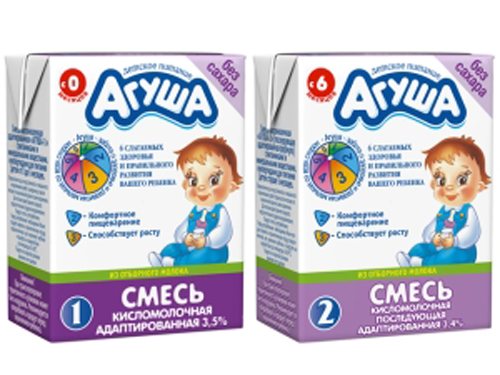
Another liquid mixture that recently entered the Russian market is Bifilin. It has a unique composition, because... includes living bifidobacteria capable of reproduction. It is recommended by doctors not only for children, but also for adults to improve and restore the microflora of the stomach and intestines. However, pediatricians do not recommend it for newborns due to the discrepancy between the pH level and it is not adapted.
Composition of fermented milk mixture
Fermented milk formula for newborns with constipation may contain:
- Probiotics are parts of food that are not digested in the upper gastrointestinal tract and enter the large intestine. In it, they are processed by microflora, forming feces, making them softer. Another function of prebiotics is the colonization of microflora by beneficial bacteria; the more of them, the more effective the relaxation.
- Lactulose , obtained by processing whey, is the only laxative for babies under one year old.
- Live bacteria that activate the normalization of intestinal microflora, displace harmful microorganisms, protect the intestines from infection, and reduce the degree of allergic reaction. Probiotics are involved in the process of lactic acid fermentation, resulting in substances that affect intestinal peristalsis (contraction of the walls, facilitating the removal of substances from the body).
- A low percentage of protein content promotes rapid digestion of food and its movement into the large intestine.

It is recommended to introduce the mixture gradually, monitoring the child’s condition
How to choose fermented milk formula from birth
For newborn babies with digestive problems, only adapted formulas that are similar in composition to human breast milk are suitable. They are marked “1” or “KM”.
For the main feeding of a baby, the following mixtures are optimal: “Nutrilon”, “Bellakt” and “NAN”, which can be fed to the baby before the introduction of complementary foods. However, it is better to choose based on the reaction of the child and his body, after consulting with a doctor.
Baby formula is sold in many stores, pharmacies, and can also be purchased online. For example, a wide range of children's products and toys in the Detsky Mir online store is very popular. Fermented milk mixtures, hypoallergenic, for different ages of babies and from various manufacturers can be selected at the best prices.

Varieties
Most often, pediatricians opt for the following mixtures:
- NAS;
- Nutrilon;
- Agusha;
- Similac;
- Nutrilak.
NAN is an adapted fermented milk formula for newborns, which is rich in vitamin-mineral and probiotic complex. NAN is prescribed by pediatricians for intestinal dysbiosis and digestive disorders. When treating with antibiotics, it is advisable to give the child NAN, because it will prevent the development of dysbiosis.
NAN is a complete breast milk substitute that can be used from the first days of a child’s life. NAN is introduced into children's diets when there is insufficient amount of mother's milk or its complete absence. In addition to NAS, newborns are often prescribed Nutrilon, Similak, Nutrilak and Agusha.
Agusha children's fermented milk formula is also known for its rich composition. The product is endowed with probiotic properties, contains bifidobacteria and lactobacilli, therefore it is an ideal choice for digestive disorders.
There are also less adapted mixtures, the so-called “casein formulas”. These include Similac, the main component of which is casein. Similak is not so close to the protein composition of human milk, but in terms of the remaining components - carbohydrates, fats and vitamins, it does not differ from adapted mixtures.
Rules for introducing fermented milk mixture into the diet
Recommendations from pediatricians for introducing fermented milk mixtures into the diet:
- The baby cannot be immediately switched to fermented milk;
- should be introduced gradually, trying to replace feeding with a regular formula with a medicinal one in parts;
- mixing different mixtures in one bottle is strictly prohibited;
- first they give regular food, and then give a small amount of fermented milk: due to the unusual taste, some children may refuse to eat it, so the first time should be given in a small portion of 20 ml;
- then they are replaced with medical nutrition several times a day, only then can you switch completely to feeding such a mixture;
- Nutrition with such a mixture is usually prescribed by a doctor for medicinal purposes for a short time, and after normalization of stool and the digestion process, you can return to the usual mixture.
According to expert ratings and reviews from mothers, the best mixtures are “NAN”, “Nutrilak” and “Nutrilon”. However, when choosing, you often have to take into account the child’s personal taste preferences: he may like the taste of one product, but not another.
All of the above mixtures act on the baby’s body in a similar way, so when choosing the optimal nutrition, sometimes you have to try several brands of mixtures in a row.
When introducing any fermented milk mixture, it is necessary to carefully monitor the reaction of the baby and his body, because possible and negative manifestations:
- allergic reactions (rash, redness of the skin);
- diarrhea or vomiting, increased regurgitation;
- the child becomes lethargic and weak, does not gain weight well;
- sleep disorders.
In such cases, parents understand that this formula for children's fermented milk food is not suitable, so it is recommended to consult a pediatrician and try another one.
Features of fermented milk formula for newborns
Among infant formulas, fermented milk formulas occupy a special place. The composition of the mixture is selected so that it is adapted to the baby’s body and is able to normalize digestion during periods of disruption of its functioning. Fermented milk formula for newborns for constipation, if chosen correctly, will also help alleviate other conditions of the baby.

According to statistics, almost every third child has digestive disorders
What is the exclusivity of this product and the difference from simple mixtures:
- This is an adapted product with medicinal properties. It is used only after the recommendations of a pediatrician in connection with gastrointestinal problems.
- Probiotics included in the mixture create favorable flora in the stomach and prevent the proliferation of harmful microorganisms.
- Live bacteria are used for mixtures .
- Manufacturers comply with the quality conditions determined by the sanitary legislation of the Russian Federation, the European Union and WHO recommendations.
- Cultures of microorganisms must be isolated from the human body and not cause harmful effects.
- Bacteria used for mixtures counteract external factors and also retain their properties during storage and use.
- When entering the baby’s body, live bacteria release lactic acid, which normalizes the functioning of the digestive system, has a beneficial effect on stool and increases appetite.
Recipes for baby formula dishes
Many mothers, whose children have grown up and still have boxes of formula, prepare very tasty dishes from them. Any mixtures (both powder and liquid) are suitable for them.
A few recipes and examples of what to prepare from baby fermented milk formula:
- The most popular are pancakes and pancakes, which are prepared in the usual way, only instead of milk a diluted mixture is added;
- Delicate sweet children's cottage cheese - prepared in the standard way from any mixture: heat the liquid in a saucepan, add kefir or sour cream and leave overnight, in the morning heat to +40 ° C, set aside for 15 minutes, then strain through cheesecloth.
- Mannik from “Agusha”: 2 bags of mixture, 2 eggs, ½ tbsp. flour, 1 tbsp. semolina, ½ tbsp. sugar, salt, soda or baking powder. Mix semolina and Agusha and leave for 2 hours for the cereal to swell. Then add the rest of the ingredients, knead the dough to the consistency of sour cream, you can add dried fruits. The pie is prepared in a greased pan for 30-40 minutes. in the oven at + 180 °C. Sprinkle powdered sugar on top.
- An old recipe from the times of the USSR - candies from dry baby formula, made with the addition of ice cream and melted butter. Then form balls and roll in cocoa and coconut flakes, put in the refrigerator.

Dry and liquid fermented milk infant formulas are very popular among mothers, who use them to help normalize digestion and the functioning of their babies’ small tummies.
How many times a day should you give fermented milk mixture?
The number of doses of fermented milk mixture depends on what problems you are solving by including this product in your diet. Fermented milk formulations for children help in the treatment of:
- intestinal infections (restore microflora);
- mild lactose intolerance (help process lactose);
- allergic rashes;
- dysbacteriosis;
- enzymopathies (deficiency of certain enzymes);
- anemia (iron is not absorbed)
Should I give fermented milk formula if the child is only bothered by gas and frequent regurgitation? In such cases, medicinal mixtures are prescribed for preventive purposes. To normalize digestion, two feedings with compounds containing beneficial bacteria are enough. Doctors recommend using fermented milk mixtures during the second and penultimate feedings.
When solving serious problems, pediatricians advise switching completely to fermented milk formulations. On average, the child’s condition improves noticeably after 2-3 months of using such mixtures. You need to prepare baby food immediately before feeding.
Expert opinion
Our store offers adapted fermented milk mixtures from all world brands. You can find here many products that have been used since birth. Your pediatrician should recommend the type of formula. We will tell every buyer how fermented milk formulations for newborns and older children (from 6 months) are labeled. Our employees will teach you how to properly prepare the mixture and tell you how and how long you can store an open jar.
Specialist of the online store “Daughters and Sons” Antonova Ekaterina
conclusions
New foods should be introduced into children’s diets according to a special scheme, gradually increasing the portion of fermented milk mixture. When the volume of the composition increases, it is given through feeding; the body needs to get used to the new portion.
The question of whether a child can be given fermented milk formula not several times a day, but constantly, causes controversy in parent forums, but pediatricians recommend completely switching to fermented milk formula nutrition until all problems disappear.
What could be tastier and healthier than mother’s milk for a newly born baby? But, for various reasons, often beyond a woman’s control, circumstances develop in such a way that she is forced to stop breastfeeding. In these cases, an adapted milk formula comes to the aid of mother and child, which can replace breast milk without harming health.
To feed infants, manufacturers produce a huge range of different brands and types of baby food, which is constantly growing and expanding. But when you start feeding your baby with them, be prepared that not all of them will suit your baby equally well.
Despite the fact that the adapted formula is very close in composition to breast milk, when it is introduced into the diet, the baby may experience digestive problems. If your child experiences frequent regurgitation, bloating, constipation or loose stools, you need to contact your pediatrician about choosing the right and balanced diet. In this case, doctors often advise adding sour milk mixtures to the daily menu of newborns.
Useful properties and composition
Unlike simple adapted mixtures, fermented milk mixtures are obtained by fermenting milk with the help of lactic acid bacteria and are made on the basis of curdled, partially digested protein. Due to this, they are better absorbed, help increase gastrointestinal secretion, are digested faster and pass from the stomach to the intestines. In the colon, the components of acidic mixtures have a detrimental effect on pathogenic microflora and at the same time help to increase the growth of beneficial microorganisms.
Consequently, the valuable qualities of acidophilus mixtures make them the best product for feeding newborn babies prone to constant regurgitation, constipation and colic.
They are great for babies with insufficient digestive enzymes or children prone to allergies. In addition, only acidic mixtures contain a large amount of calcium, which is so necessary for the formation of a strong skeleton, and iron, which is absorbed much faster from an acidophilic mixture.
They almost always contain additional substances that are indispensable for the proper development of the newborn:
- probiotics and prebiotics (lacto- and bifidobacteria) - improve the digestion process, prevent the formation and reproduction of pathogenic microbes in the intestines and help improve immunity
- Taurine is an essential amino acid for newborns; it is involved in the formation of the central nervous system and brain development.
- Lysozyme is an enzyme that protects the intestines from infections
- Lutein is an antioxidant that protects a child’s eyes from UV radiation.
- Nucleotides are substances that form the immune system and take an active part in the development of the baby
- Vitamins and minerals
Based on the above, we can highlight a number of indications when taking fermented milk mixture must begin from the first days of the baby’s life:
- Constipation and intestinal colic
- Intestinal disorders
- Dysbacteriosis
- Premature babies
- Recovery after antibiotic therapy
- Allergic dermatitis
- Hypotrophy (low weight gain)
If the baby develops normally and has no problems with the gastrointestinal tract, pediatricians recommend starting to consume kefir, yogurt and other fermented milk products only from 8 months.
How to introduce a new product?
Fermented milk mixtures cannot be a complete replacement for regular adapted ones. It is better to introduce any product new to the baby into the diet gradually, in small portions, combining it with the child’s usual diet.
To start, replace a third of one of your meals with an acidophilus mixture. For example, your child eats 120 ml per meal. Thus, during this feeding it is necessary to leave 80 ml of a simple formula and supplement with 40 ml of fermented milk. After three days, we increase the amount of fermented milk product to half the volume of feeding. That is, we give 60 ml of regular and 60 ml of acidic mixture. After another three days, you can give 80 ml of fermented milk and 40 ml of regular milk, and in the next three days we completely replace one feeding with a new healthy product.
The goal you are pursuing by introducing fermented milk will depend on how many times a day you need to feed it to your newborn, as well as the duration of its use.
To prevent dysbiosis or intestinal disorders, this product usually replaces one or two feedings a day, and for medicinal purposes you can completely switch to it for up to two months. Or use only once, as needed, in case of constipation.
In any case, only a pediatrician should prescribe the correct feeding regimen for the baby and explain the schedule for transition to it.
It is not worth feeding a newborn baby exclusively with fermented milk formula, as this can lead to an imbalance in the acid-base balance in the intestines and acidification of the blood. It is undesirable to use acidic mixtures for inflammatory and allergic processes in the respiratory system.
It is not always possible to choose the right formula for newborns the first time if, with the start of complementary feeding, you notice the appearance of such signs as:
- Rash, itchy skin and redness
- Liquid stool with undigested mixture particles
- The child often remains hungry
- Little weight gain
You should immediately stop using it and find another, more suitable one.
What mixtures are best to choose for a baby?
Manufacturers produce two types of fermented milk mixtures:
- Dry ones, which are diluted with water immediately before use.
- Ready-made, they only require heating and have a short shelf life. Packaged in 200 ml, tetra packs.
All of them are high-quality products, with probiotic and vitamin-mineral complexes, for complete and balanced nutrition.
You can start preparing the dry formula only just before feeding, strictly following the instructions on the package and the proportions. Its optimal temperature during feeding should be 37-38˚C.
If the child has not mastered the entire volume offered to him, leaving the prepared mixture for the next feeding is strictly prohibited, since it is an excellent breeding ground for the growth of bacteria.
Based on age, fermented milk powders are divided into several categories:
- From 0 to 6 months
- From 6 to 12 months
- From a year and up
The finished mixture is produced under the Agusha brand and differs in the first and second stages, the recommended age for introduction into the diet is from four and six months of age, respectively.
The older the baby gets, the less adapted the formula is needed to feed him. You can switch to non-adapted formulas after reaching one year of age, when the child’s body is strong enough.
There is no point in saving when choosing fermented milk mixtures by purchasing a cheaper product and purchasing for future use; there are no guarantees that this particular mixture will suit your child. And which one to feed your younger generation is up to you to decide, of course, without neglecting the advice of pediatricians.
Breast milk is the healthiest food for a newborn, but mothers are not always able to provide breastfeeding. Some women have no milk or the baby refuses to breastfeed. I have to forget about feeding even after surgery and taking medications.
In this case, there is a need to switch to artificial feeding with infant formula, including fermented milk. Although they cannot completely replace mother’s milk, they provide the baby with all the necessary nutrients.
They are made on the basis of milk protein and contain bifidobacteria that are important for the body, which normalize the functioning of the child’s digestive tract.
The invention of infant formula became a real godsend for mothers and babies and made it possible to solve the problem of feeding newborns. It is worth noting the fact that they are easy to prepare, as well as convenient to take with you and breed.
Young mothers often do not know how to properly feed their baby fermented milk formula . Pediatricians suggest that you need to start giving fermented milk mixtures gradually in small portions.
At the same time, it is recommended to combine fermented milk compositions with regular ones. It is important to monitor the child’s body’s reaction to a particular mixture and, at the first sign of an allergy, switch to another composition.
Either a pediatrician or an allergist should prescribe and tell you how to administer fermented milk mixture Most often, such mixtures are prescribed to premature babies and those suffering from intestinal disorders.
The standard recipe involves a combination of fermented milk mixture and regular one in a one-to-one ratio, but the numbers may change in each specific case.
Parents are offered both dry and ready-made formulas. The first ones need to be diluted with water for baby food.
It is not worth switching your baby completely to such mixtures, as there is a high risk of disrupting the acid-base balance of the intestines.
How to properly feed your baby with fermented milk formula
The choice of baby food is very large, they all have different compositions, and it must be selected individually.
Let's look at the most popular companies - Agusha and Nan. Each of them has its own feeding patterns; they must be strictly followed so as not to cause intestinal discomfort in the baby.
Kinds
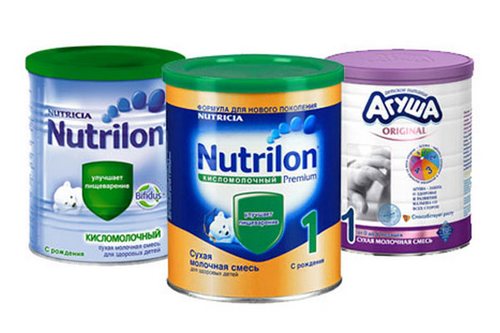
Parents should know what fermented milk mixtures are so as not to purchase a product that turns out to be useless. There are a variety of types of such baby food on the modern market. They differ in composition, consistency, degree of adaptation and in that they are developed for children of different ages.
According to the degree of adaptation:
- fully adapted fermented milk mixture for babies under six months of age;
- partially adapted nutrition for children after 8 months.
According to the age:
- the number “1” on the packaging means that these are fermented milk formulas for infants, which can be given from birth to six months;
- the number “2” is fermented milk mixtures for children up to one year old, starting from 6 months.
By consistency:
- dry fermented milk mixture, which must be diluted with water (the proportions are indicated in the instructions), has a long shelf life, and is represented on the market by the most famous brands - Nan, Nutrilak, Nutrilon, Nutricia, Similac, etc.;
- liquid, which must be used within 2-3 days (represented by Agusha, Bifilin).
It is not difficult to find children's fermented milk formulas on the modern market in accordance with the child's age, individual preferences (liquid or dry form) and the financial capabilities of the parents. The choice is greatly facilitated by the recommendations of pediatricians, who can prescribe a specific product.
Blend selection
The pediatrician should make recommendations on this matter, depending on the individual characteristics of the baby. The specialist bases his choice on the following indicators:
- Adapted composition for feeding babies up to six months. Such mixtures are produced as liquid, ready-to-use (Agusha1) or powder (Nutrilon fermented milk, NAN, Nutrilak, Similak, etc.).
- Partially adapted composition after 8 months, during this period you can use the acidophilic mixture “Malyutka”, the drinking product Bifilin. The pediatrician will indicate how long to take such mixtures, based on the baby’s condition.
How much to feed Nan fermented milk formula
Fermented milk Nan is recommended for healthy babies whose breastfeeding is impossible for one reason or another. Also prescribed for children with intestinal disorders and constipation. Belongs to the premium class category. In addition to a balanced protein composition, it contains iron (to prevent anemia), selenium, and minerals.
- Children up to six months are prescribed Nan-1. Helps strengthen the baby's immunity and protect against intestinal infections.
- At the age of 6 to 12 months, Nan-2 is prescribed.
VIDEO ON THE TOPIC
The manufacturer also offers lactose-free Nan. Prescribed for children and adults with lactose intolerance, mild diarrhea, and exacerbations of gastroenteritis.
Despite all the usefulness of modern baby food, the mother, with the help of specialists, must make every effort to maintain lactation and breastfeeding, which is extremely important for building the child’s immune system.
How to enter correctly
Mothers want to save their little ones from problems once and for all. But medicinal mixtures act gradually: the immature children’s digestive tract will not accept an immediate replacement of the usual diet with fermented milk mixture.
The number of feedings with therapeutic nutrition is determined by the pediatrician. He decides how many times a day and when to give the compounds. Feedings do not happen in a row, one after another. The principles of introducing therapeutic nutrition are moderation and gradualness.

How to proceed:
- Children need restful sleep. New foods may cause discomfort. Children should not be fed at night.
- Meals need to be alternated.
- Feeding should be replaced in stages. On the first day, give 1/3 of the norm. Continue this way for 2-3 days. Then give 2/3. Continue for 2-3 days. Then replace the meal completely.
- First you should give the fermented milk mixture, then the usual one.
- Eating sour milk is not hypoallergenic: you should constantly monitor for possible manifestations of allergies. When the first signs appear, you must stop giving the mixture.
Pediatricians advise: in children under one year of age, milk should be the first and last feeding.
Parents are wondering whether it is possible to feed formula constantly. Therapeutic food should not be given to the baby all the time. It is designed to save the baby from problems or help recover from illness. Then you need to return to your usual food. With prolonged use, the acidity of gastric juice changes. Nutrition is harmful to the baby’s body.

How to choose a mixture?
It is necessary to choose baby food for artificial feeding after the pediatrician examines the baby and determines which types of formula are best used for the newborn.
In addition, every mother should know what to look for when buying Bellact formula, what types there are, and also in what cases it is recommended to give this or that product for feeding babies in the first months after birth.
Rules for selecting infant formula:
- For newborn children, you should buy only adapted milk formulas, which in composition are as close as possible to mother’s milk, and also do not cause difficulties in assimilation and digestion by the infant’s fragile gastrointestinal tract.
- When choosing a mixture, pay attention to the age label, which is indicated on the product packaging. “0” is suitable for feeding premature babies or babies with insufficient body weight, “1” – from birth to six months, “2” – from six months of age to one year, “3” – after 12 months and older.
- When a baby has problems with health or absorption of nutrition, then preference should be given to medicinal formulas for artificial feeding. In this case, there is no need to constantly feed the child with specialized food - in many cases, replacing one or two meals is enough.
- When purchasing, read the ingredients. Please note that the composition does not contain unnecessary chemicals, but contains a wide range of vitamins and minerals. Avoid mixtures that contain oils such as canola or palm.
- Look at the expiration date and do not buy a product if there is very little time left before it expires.
- Purchase feeding formulas from specialized or large retail stores where storage conditions are not violated.
- When feeding, pay attention to the baby's reaction. If you notice constipation or diarrhea, or notice a rash, immediately contact your pediatrician for advice.
Bellakt infant formula takes its rightful place among the wide range of products for artificial and mixed feeding of children. However, when choosing baby food, you should not be guided by the popularity and price of the product, but pay attention to the composition and how the baby’s body reacts to this type of formula for newborns.

